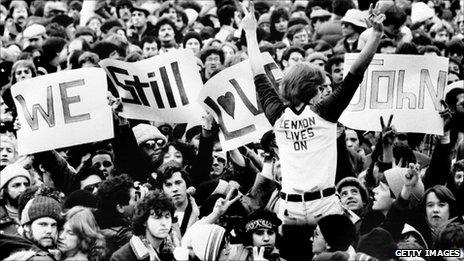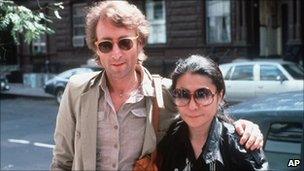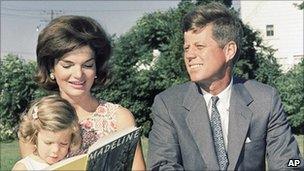John Lennon: Where were you when?
- Published
- comments

A huge wave of sympathy for John Lennon manifested itself in public grief
John Lennon's death 30 years ago was one of those shocking, poignant "where were you when" moments that fashion collective memories out of historic events.
Many are sudden deaths - that of JFK being the most notable. Outbreaks and conclusions of war, scandalous resignations of heads of state, sporting miracles, and audacious crimes can all become a "where were you when".
But why do we remember where we were when we heard Princess Diana had died, or Margaret Thatcher resigned? Here some of those who have been influenced by these extraordinary occurrences explain why some stick so vividly in the mind and live on in our imagination.
JOHN LENNON'S DEATH - NEW YORK, 8 DECEMBER 1980
Who: Kevin Howlett, radio producer and Beatles historian, 23 when Lennon died
"I heard the news on breakfast radio and was totally shocked. All day I was in a complete daze. There were two John Lennon LPs that I didn't have that I went and bought. For some reason I had to do that.
"I do remember London being particularly strange that day. I travelled in on the Tube and the atmosphere seemed very strange. People did seem to be very affected.
"The Beatles were so bound up with our childhood. John was the very funny and the cheeky one. It had a big personal effect to learn of his death.
"(Just like) Starting Over had come out. Having had silence for five years, now you had been cheated of more creative work.
"With John it seemed like losing somebody very close to you. It was a personal thing. The Beatles were so bound up in everybody's experience of the 1960s. It seemed to be a loss of innocence - somebody who had brought so much joy, who seemed to be in a peaceful state.
"It did have an effect on the way people perceived John. People reappraised the [solo] music. Many singles went into the charts and so people looked back over his catalogue."
Personal aftermath: Worked on celebrated Beatles radio series in 1982, as well as a 10-part series on John Lennon in 1990, and several books and other Beatles-related projects.
Who: Philip Norman, novelist, journalist and author of Shout!: The True Story of the Beatles, 36 when Lennon died
"It happened before midnight in New York, the early hours in the morning in London. I was woken up by a phone call from a friend in Los Angeles who told me.
"I happened to have just delivered Shout to the publishers. I had left a section at the end because I thought there was a chance of going across to talk to Lennon. He had just emerged after five years of seclusion.

Lennon had recently re-entered the limelight and seemed content
"I had talked to his Aunt Mimi. I had talked to so many people who were close to him. I had followed this character through his childhood, the young years, as a Beatle. It felt like someone I knew intimately.
"The initial pressure was journalistic. I was suddenly the person who knew everything about Lennon. I had to write 4,000 words for the Sunday Times Review.
"There were people who said all this grief, who said all this is weird and dysfunctional, but it was such a horrible shock.
"Assassination was something that didn't happen to pop musicians - it happened to kings and queens and heads of state. It just seemed so horrifying that this kind of madness would be extended to someone who had brought pleasure to the public.
"From then on entertainers began to be afraid that their fans in a perverted adoration would try and take their revenge against them.
"In the 1970s a lot happened in music. People generally thought the Beatles had had their day. It suddenly all came back, just what they meant, just what Lennon meant to the Beatles, an incredible resurgence of awareness of the Beatles. There had always been a thought they would come back.
"John himself has almost the status of a secular saint. The memorials to him are all over the world. It crosses all the boundaries of culture and religion. I imagine he would have been horrified to think of himself being treated as a saint."
Personal aftermath: As well as Shout!, Norman also wrote John Lennon: The Life in 2008
Where were you when you heard about John Lennon's death? Let us know using the comments box at the bottom of this page. The Magazine is drawing together your memories to publish later this week.
JFK'S ASSASSINATION - DALLAS, TEXAS, 22 NOVEMBER 1963

JFK's popularity soared after his death and remains very high
Who: Michael Kazin, historian and co-author of America Divided: The Civil War of the 1960s, 15 when JFK died
"I was 15 years old, a sophomore in high school in Englewood, New Jersey. School was just about to end when I heard about it. My school was on a hill, a mile walk from the downtown. We walked down the hill. I've never seen a town in the middle of the day, in the middle of the week so quiet. It was completely silent.
"Everybody was whispering as if they had seen a thousand people die instead of just one.
"I saw, like a lot of people, Oswald being shot live on television.
"As a historian of the 1960s I tell students that in some ways this seemed to be the end of a certain emotional golden age. In the US at least, it seemed to be the end of a time when there was relative stability, relative consensus about the major issues in politics, a sense that a certain sort of domestic idyll was the idea most Americans had.
"The political authorities were to be trusted. Until the mid-1960s when you asked Americans do you trust the government to do the right thing most of the time, a majority said yes. There has not been a time, except after 9/11 when that's been true since. Americans expect to mistrust the authorities. They are very cynical.
"The shooting coincided with the beginning of racial conflict. It coincided with the war in Vietnam, and the beginning of the counter culture. In some ways it was coincidence. After Kennedy was killed two-thirds of Americans said they had voted for him. [The real figure was half.]"
Personal aftermath: Kazin later wrote about the Kennedys as well as teaching the history of the 1960s
PRINCESS DIANA'S DEATH - PARIS, 31 AUGUST 1997
Who: Ingrid Seward, editor of Majesty magazine, 48 when Diana died
"I was in Sussex, the phone rang at 2am and it was CNN to say that Diana had been injured in an accident and my reaction was 'poor Diana, just when she had found happiness'. The phone just rang all night. I remember my husband getting up and saying it was going to be a long night.
"People felt they knew Diana because she had told us so much about her life. I knew more about her than I did about my best friend. Her dying was so tragic.
"There was a psychological reason people got like they did. It was a sort of mass mourning.
"I remember the quietness of the day of the funeral [on 6 September 1997]. I got up and went very early [to a spot outside Westminster Abbey]. You could have heard a pin drop. London was quiet.
"People are inclined to tell you what they felt and everyone remembers it. I remember the sea of flowers, the smell of the flowers, this eerie silence, the candles, and people sobbing in the park.
"After the funeral cortege had gone on its way, the bells of the abbey started ringing."
Personal aftermath: Seward has written a number of books on Diana and other members of the Royal Family
RISE AND FALL OF THE BERLIN WALL - BERLIN, 13 AUGUST 1961 AND 9 NOVEMBER 1989
Who: Frederick Taylor, author of The Berlin Wall: 13 August 1961 - 9 November 1989, aged 13 when the wall went up
"I remember every detail of it going up even though I was only 13 at the time because my father died that week. You would think that's all you would remember.
"He had a heart attack and to distract ourselves about what was going on, we switched the television on and there was the Berlin Wall being built and all kind of activities going on - people at work and the guards. It was the first great crisis to be recorded by TV and seen by millions.
"In contrast when the Berlin wall came down I had become a student of German history
"At the time the Berlin Wall fell I knew nothing about it. I lived in Cornwall. We were going up to London but unfortunately the television set in the flat wasn't working.
"We arrived, had a nice early supper and went to bed. It was only in the morning when I woke up and got the paper.
"It was extraordinary. It is one of the things I would love to have seen. It was weird… knowing about it afterwards then managing to get to see pictures of it.
"I had spent time in East Germany and hated the closed-in nature, turning the country into a prison.
"It was terrifically dramatic and joyful. It took several days to realise the significance with JFK or John Lennon. With the wall coming down you knew exactly what was going on.
"We don't have to know anything about history. It's an instinctive, animal thing.
"That was the fall of communism. The wall coming down was symbolic of the fact that pressure for change could no longer be resisted."
Personal aftermath: Taylor continued his interest in modern German history
By Finlo Rohrer
Where were you when you heard about John Lennon's death? Let us know using the comments box. The Magazine is drawing together your memories to publish later this week.